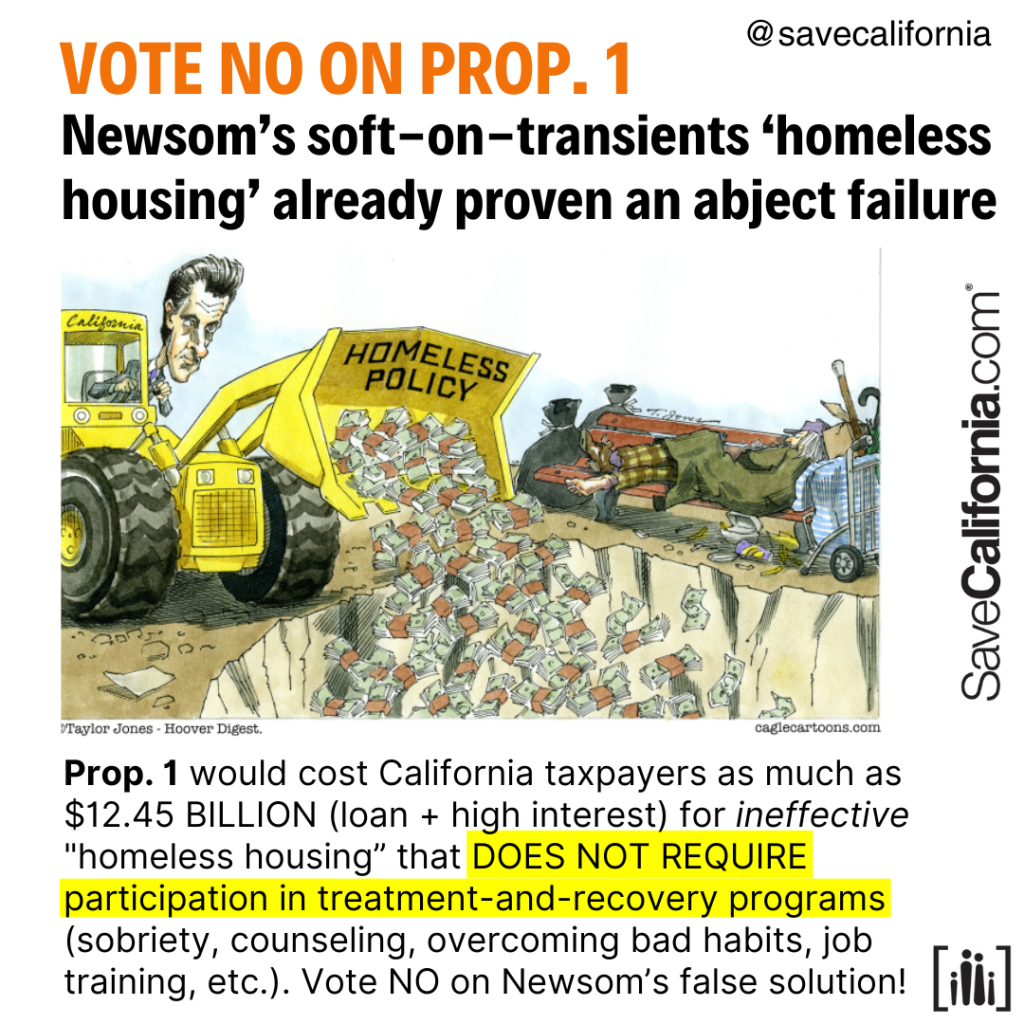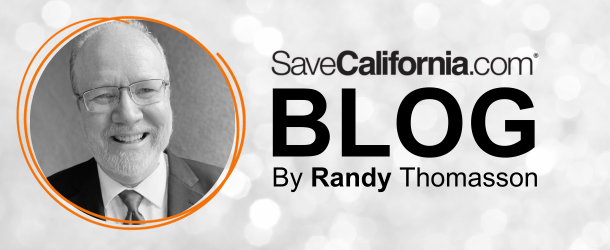
Proposition 1 on California’s March 5, 2024 ballot is another deceptive Democrat Party scheme of imagery over substance that rejects tried-and-true solutions.
And “homeless housing” has already been an abject failure in California’s Democrat-controlled big cities because it’s “free housing without any requirements.” So no “change” required — no wonder transients flock to California. If the transient magnet of Prop. 1 passes, you can bet California will have more “homeless,” not less.
“Despite Spending $1.1 Billion, San Francisco Sees Its Homelessness Problems Spiral Out Of Control,” Hoover Institution, May 10, 2022
It is hard to imagine a more inhumane outcome than watching the train wreck of homelessness evolve in San Francisco, as the city spends billions on flawed policies that facilitate drug abuse and on badly designed systems to carry out those policies. But this is what happens when there is no accountability within government, and with voters who would prefer feeling good about electing progressive politicians to facing the reality of the awful mess that has been created by those they have elected.
California’s ruling Democrats don’t require transients to enter treatment-and-recovery programs as a condition of housing, so these costly programs fail:
“California homelessness: Where are the state’s billions going?,” CalMatters, May 22, 2023
The state keeps spending more to address the crisis, and the crisis keeps getting worse. So where, they ask, is all the money going? The state’s Interagency Council on Homelessness, a state body tasked with overseeing the state’s homelessness strategy and divvying up funding to local governments, issued a report detailing just how much the state has spent on the crisis between 2018 and 2021 — and what it’s gotten in return.
The answer to those questions, according to the report: The state has spent nearly $10 billion and provided services to more than 571,000 people, each year helping more people than the last. And despite all that, at the end of year three, the majority of those more than half a million Californians still didn’t end up with a roof over their heads. The number of unsheltered Californians continues to swell.
Presented at a three-hour joint committee hearing in the Assembly, the report has sent housing policy experts across the state into a twitter. Services for the homeless are so disjointed — split among nine state agencies, hundreds of county and municipal governments, nonprofits and charitable organizations — the 253-page document may be the first statistical birds-eye view of the state’s many-tentacled efforts.
But it also shows just how intractable the problem is. “One of the largest challenges facing the state is the inflow of new people into homelessness, even as efforts to help people experiencing homelessness expand,” the report reads. What the report did not address is how the state can spend its money more effectively. Nor was it asked to. The report comes at the request of the Legislature, which included an ask in its 2021 budget for a “comprehensive view of the homelessness response system,” not an audit nor a list of recommendations.
UNDERSTAND: “Housing First is a Failure,” Cicero Institute, Jan. 13, 2022
Why doesn’t permanent housing help people exit from homelessness? A simple reason is that it appears to attract more people from outside the homeless system, or keeps them in the homelessness system, because they are drawn to the promise of a permanent and usually rent-free room.
A recent economic analysis shows that cities have to build 10 PSH beds to remove a single homeless person from the street, since the vast majority of such units go to people who would not have been permanently homeless. Even the removal of that sole homeless individual from the streets seem to fade over time as more people enter the homelessness system.[4]
…
Another reason Housing First doesn’t work is that it ignores that the major problems for the chronically homeless aren’t just lack of a home. A recent UCLA study found that more than 75% of this population have a serious mental illness, and 75% have a substance abuse problem, and the majority have both. These individuals are reluctant to accept assistance without mandates and requirements, and a house without such mandates will not encourage use of these services.[9]
There was once some hope that housing alone could help reduce drug use and mental health problems. Yet studies have now shown that simply providing people subsidized housing does not reduce drug use, and often encourages it, which makes sense because there is no mandated treatment in PSH and the free unit provides people with more money to pursue their habits.
More fact-based perspective:
“The ‘Housing First’ Approach Has Failed,” The Heritage Foundation, Aug. 4, 2020
Homelessness has gained national attention with the growth of public encampments and street disorder, particularly in West Coast cities. Over the past decade, the federal government has spent billions on “Housing First” programs, which provide permanent housing for the homeless without requiring sobriety or participation in treatment. Although Housing First programs demonstrate strong rates of short-term housing retention, they do not improve symptoms related to drug addiction, mental illness, and general well-being—and have not reduced overall rates of homelessness.
“To Fix Homelessness, Stop Fixating On Housing,” The Federalist, May 30, 2023
Cities and states, for their part, should stop releasing without bail or jail time drug addicts and mentally ill people who commit crimes, and they need to use the threat of punishment as a way to induce street criminals to accept treatment.
At its core, Prop. 1 is throwing more money away, will make California’s homeless population grow, and will make generations of Californians poorer with the multi-billions in bonds to pay back — all so presidential wannabe Gavin Newsom can say he’s “solved” the homeless problem. Defeat this thieving scam — vote NO on Prop. 1.
See more at the SaveCalifornia.com Pro-Family Election Center
If any would not work, neither should he eat. — This is a just maxim, and universal nature inculcates it to man. If man will work, he may eat; if he do not work, he neither can eat, nor should he eat. The maxim is founded on these words of the Lord: In the sweat of thy brow thou shall eat bread. Industry is crowned with God’s blessing; idleness is loaded with his curse. This maxim was a proverb among the Jews. Men who can work, and will rather support themselves by begging, should not get one morsel of bread. It is a sin to minister to necessities that are merely artificial.
Adam Clarke’s Bible Commentary on 2 Thessalonians 3:10




 RSS 2.0 Feed
RSS 2.0 Feed